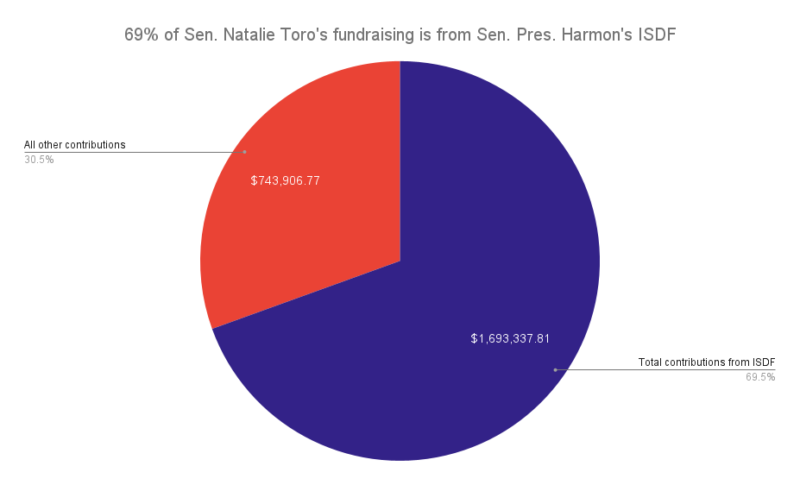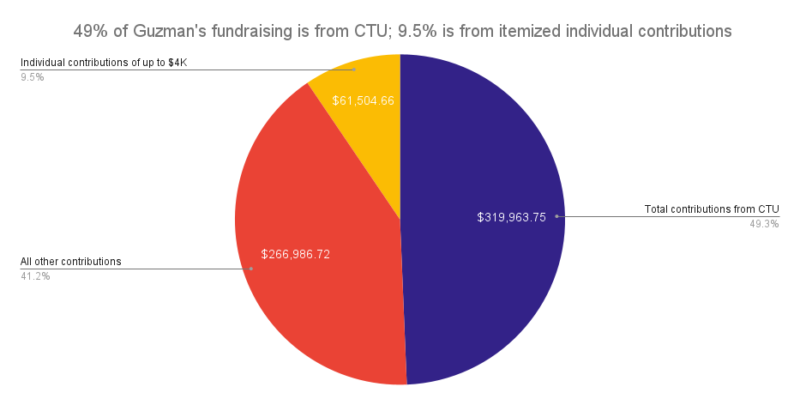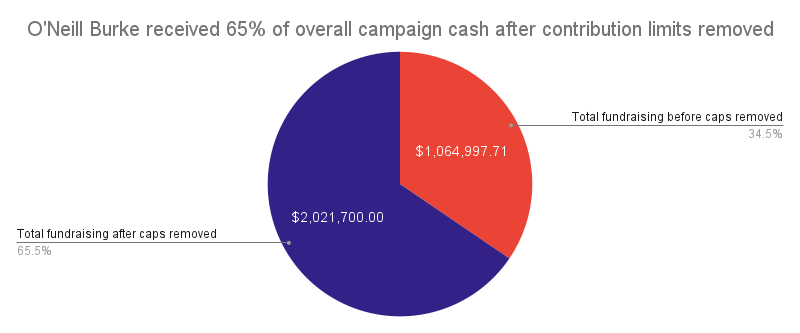Four primary races where contribution caps are out and big money is in
Read our analysis of the Democratic primaries for the 20th state senate district, Cook County Board of Review, Cook County Clerk of the Circuit Court, and Cook County State’s Attorney.
Key Takeaways:
- All four races have a clear fundraising leader. State senate incumbent Natalie Toro, Board of Review incumbent Larry Rogers Jr, Clerk of the Circuit Clerk challenger Mariyana Spyropoulos, and Cook County State’s Attorney challenger Eileen O’Neill Burke have significant advantages in the money race of their respective campaigns. Rogers, though, is also facing a well-funded super PAC that is backing his opponent.
- The 20th Senate District race represents a larger battle within the Democratic Party. Senate President Don Harmon is spending heavily in support of the incumbent in the 20th District against a candidate with strong backing from progressive unions and elected officials.
- The 3rd District Board of Review race is, at least partially, a proxy war between Rogers and Cook County Assessor Fritz Kaegi. Larry Rogers’ recent contributions to his own campaign, totaling $850K, have given him a significant fundraising advantage over challenger Larecia Tucker. But Kaegi is bankrolling a new super PAC that has spent $598K so far to support Tucker and oppose Rogers. Kaegi and Rogers have frequently butted heads and recently traded barbs in the press about this tactic.
- In the State’s Attorney race, O’Neill Burke’s fundraising hasn’t been hampered by her lack of party support. O’Neill Burke has consistently outraised the party’s slated candidate, Clayton Harris III, and has raised four times as much as Harris in the weeks since contribution limits were removed.
- O’Neill Burke’s self-funding opened the floodgates to large contributions to her campaign. Wealthy business leaders funneled $836K to her campaign the very same day that contribution limits were removed. Though Harris has also benefited from the lack of contribution limits, O’Neill Burke’s $2 million in recent fundraising far exceeds Harris’s $496K.
- No big donors have taken advantage of the lack of contribution limits in the Clerk of the Circuit Court and the 3rd District Board of Review races. In the Clerk race, Mariyana Spyropoulos has accepted just $4.7K in new contributions since self-funding her campaign. All of Iris Martinez’s recent contributions are similarly within the normal contribution limits. In the Board of Review race, Rogers is primarily self-funding his campaign and Larecia Tucker is receiving support from the Kaegi-backed super PAC.
- Ethical concerns regarding campaign funding have been raised in the Board of Review and Clerk of the Circuit Court races. Apart from Rogers’ criticism of Kaegi’s involvement in his race, Rogers has also attracted scrutiny for the large amount of campaign cash he’s received from donors with ties to the property tax appeals industry. In the Cook County Clerk of the Circuit Court race, incumbent Iris Martinez has accepted donations from dozens of her employees and Spyropoulos has accepted large donations from contractors with her current office, the Metropolitan Water Reclamation District (MWRD).
- Loans are the most popular method of self-funding among these candidates. All three of the self-funding candidates reached the self-funding threshold primarily via loans to their campaigns. (Contribution limits were removed in the Board of Review race due to super PAC activity.) That makes it much easier to blow the contribution caps off these races, since candidates can pay themselves back if they raise the funds to do so.
20th Senate District: Intra-party battle as Sen. Pres. Harmon backs Toro and Guzman draws significant CTU support

In the eight months since now-incumbent state Senator Natalie Toro was appointed to the 20th District seat after Sen. Cristina Pacione-Zayas joined Mayor Johnson’s administration, her campaign has raised a staggering $2.4 million to support her reelection bid. Most of that cash – just shy of $1.7 million of it – comes from the party committee controlled by Senate President Don Harmon, ISDF.
Harmon began funneling cash to Toro’s committee shortly after another candidate in the race, Dr. Dave Nayak, reached the self-funding threshold in mid-December. Harmon has also made two $68.5K contributions to Toro via two other committees he controls, Friends of Don Harmon for State Senate and Don Harmon for State Central Committeeman.
Toro is the only Illinois Senate candidate who has reported significant contributions from ISDF so far this year, likely because the 20th District is the only competitive Democratic Senate primary this cycle. ISDF’s contributions to Toro may even be on track to match or exceed ISDF’s largest overall contributions to Senate candidates during the general election in 2022. Six candidates received $1.8 million or more in support from ISDF (and represent the top six slots in ISDF’s “Top 25 expenditures”) from August 2022 until December 2022. Regardless of any additional contributions that Toro receives from ISDF, it’s clear that Senate President Harmon is willing to spend big to support his caucus members. This isn’t a new phenomenon in Illinois: in the past, legislative leaders like Mike Madigan used a combination of their fundraising prowess and the self-funding loophole to funnel big money to their favored candidates.
Toro’s estimated $2 million cash on hand means that her campaign can afford to dominate the airwaves and her constituents’ mailboxes. Though we’ll have to wait until mid-April for Toro’s campaign to tell us exactly how much they’ve spent, there’s evidence already that this is the case. Some 20th District residents report feeling “inundated” by the number of mailers being sent by the Toro campaign, according to a new Block Club Chicago article.

Graciela Guzman is the only other candidate in the 20th District race to have received support from ward committeepeople during the appointment process to fill Sen. Pacione-Zayas’s seat last year. Guzman served as the chief of staff for Sen. Pacione-Zayas and is now an organizer for the Chicago Teachers Union (CTU). She also has the backing of the same progressive movement that was integral to now-Mayor Johnson’s win last April.
Given Guzman’s self-positioning as the most progressive candidate in this primary – though each candidate has claimed that mantle – it comes as little surprise that her campaign’s largest supporter is CTU. Her campaign has received $211K from the Chicago Teachers Union Local 1 PAC and another $108K from the Chicago Teacher’s Union PAC (Illinois Federation of Teachers). Guzman has raised $648K total.
The other 50.6% of Guzman’s total fundraising comes from various sources. Her next largest overall donors are the Grassroots Political Action Committee ($86K) and the Illinois Federation of Teachers COPE ($68K). Guzman’s support from individual contributors is also worth noting: she’s raised more than $61K from individuals making contributions of up to $4K, with the average contribution being $379. These itemized individual contributions represent 9.5% of Guzman’s overall fundraising.
There are two other Democratic candidates in the 20th Senate District race: Dr. Dave Nayak and Geary Yonker. Nayak has reported $902K in contributions since creating his campaign committee last July, placing him squarely between Toro and Guzman in the money race. Nayak, though, has almost entirely self-funded his campaign: Nayak and his immediate family have contributed $854K to his committee, or 94% of his total fundraising.
Yonker has raised $24K so far for his bid for the 20th District seat. Yonker is his campaign’s largest overall donor at $17K, representing 73% of his overall fundraising.
Board of Review, 3rd District: Rogers’ contributions from property tax appeals industry attract scrutiny, Kaegi and Kaegi-funded super PAC back Tucker
The Board of Review, an oft-forgotten quasi-judicial body that considers property tax appeals, has one seat up for election this cycle. Incumbent Larry Rogers Jr. is vying for his sixth term on the Board and faces challenger Larecia Tucker next week.
The 3rd District race has been contentious. Rogers has faced recent conflict of interest allegations, and he, in turn, has argued that Cook County Assessor Fritz Kaegi’s involvement in the race to support Tucker is “[a] conflict of interest that is impermissible and should offend every taxpayer in Cook County.” (Though the Board of Review is an independent body, it does review property tax appeals for assessments made by the Cook County Assessor.)
 The vast majority of Rogers’ recent fundraising is from self-funding. Since November 2023 – the same month Rogers filed to run for reelection –, just $157K of the $1 million raised so far to support his reelection campaign came from sources other than himself.
The vast majority of Rogers’ recent fundraising is from self-funding. Since November 2023 – the same month Rogers filed to run for reelection –, just $157K of the $1 million raised so far to support his reelection campaign came from sources other than himself.
Rogers’ self-funding is also a recent trend: he began contributing large amounts to his own campaign in February, but his next most recent contribution to his campaign account was from 2018.
Notably, Rogers has not filed a notification of self-funding, despite far exceeding the self-funding threshold for his race. Rogers reached this threshold on February 16th when he loaned his campaign $100K. Just days later, though, a super PAC making expenditures to support Rogers’ opponent triggered the self-funding loophole itself. Contribution limits were officially removed from the Board of Review race on February 22nd.
Rogers has also attracted scrutiny after a recent Chicago Tribune report detailed the large amount of campaign cash he has received from the property tax appeals industry. Rogers accepted more than $800K from “property tax attorneys, appraisers, and consulting firms just in the last 10 years.” The Tribune stated that $135K of those funds hit Rogers’ campaign account in 2023, representing 60% of the funds raised during that same period.
Larecia Tucker’s total fundraising is just over $100K at the time of writing. But while Rogers may have a vast lead in the money race due to his self-funding, Tucker’s top donor is willing to bankroll a super PAC – to the tune of $680K – in support of her campaign.
The top donor to Tucker’s campaign is Friends for Fritz, the campaign committee for Cook County Assessor Fritz Kaegi. Friends for Fritz has contributed more than $25K to Tucker’s campaign so far. Kaegi and his wife have each individually contributed an additional $6.4K, bringing Tucker’s total Kaegi-affiliated contributions up to $38K.
Tucker is her own second-largest donor, having contributed more than $17K to her campaign account.
In addition to supporting Tucker directly, Kaegi is currently the sole donor to a new super PAC called Stop Tax Corruption Cook County. Kaegi has loaned Stop Tax Corruption Cook County $680K total, and the super PAC has spent $598K to both oppose Rogers and support Tucker’s bid for the 3rd District seat. It’s clear from this that Kaegi is willing to flex his political muscle for a shot at replacing Rogers on the Board of Review.
Cook County Clerk of the Circuit Court: Despite Spyropoulos’s massive self-funding, a quiet fundraising front
Incumbent Clerk of the Circuit Court Iris Martinez faces attorney and Metropolitan Water Reclamation District (MWRD) commissioner Mariyana Spyropoulos during this year’s primary election. The Clerk of the Circuit Court is responsible for managing all of the Cook County Circuit Court’s case filings.
Martinez won her first term in 2020 without party support. Though Martinez sought the party’s backing for her reelection, Spyropoulos ultimately received the coveted Cook County Democratic Party endorsement last summer.
Martinez has drawn attention over the last few years for her endorsements of candidates who weren’t endorsed by party leaders, including some with questionable Democratic credentials. She has also faced criticism for her management of the Clerk’s office – such as accepting political contributions from employees and mishandling criminal records for some participants in diversion programs.
Spyropoulos, for her part, acknowledged that she had received contributions from district contractors during her time at the Metropolitan Water Reclamation District after a Chicago Tribune analysis showed that she had received more than $140K from companies that had done business with the board since 2010.
Martinez’s Top Donors
| Donor | Total Amount Contributed Since 1/1/21 |
| Chicago Land Operators Joint Labor-Management PAC | $56,500.00 |
| Engineers Political Education Committee | $50,000.00 |
| International Brotherhood of Teamsters Local 705 PAC | $16,500.00 |
| UFCW Local 881 | $10,000.00 |
| Chicago Firefighters Union Local #2 | $6,000.00 |
Iris Martinez’s fundraising is substantially less than her opponent’s this cycle. Her campaign committee, Iris for Cook County Circuit Court Clerk, has raised $229K since the start of the current election cycle in 2021. Her recent top donors include the Chicago Land Operators Joint Labor-Management PAC ($56K) and the Engineers Political Education Committee ($50K).
Caps were removed from this race on February 15th after Sypropoulos met – and far exceeded – the self-funding threshold. This lack of contribution limits has not significantly affected Martinez’s fundraising. Though her campaign has raised just over $72K in the past few weeks, all of those contributions were within the normal limits.

Spyropoulos has a commanding lead in the money race—due entirely to her self-funding. Since receiving the party’s endorsement back in August, her campaign has raised just $94K from sources other than Spyropoulos and her immediate family. Spyropoulos’s self-funding totals $1.3 million, or 96% of her total fundraising for this race.
Spyropoulos loaned her campaign a jaw-dropping $875K on February 14th, followed by a $384K loan on February 16th. She included the $875K loan in her notification of self-funding, and caps were officially removed in the race on February 15th. Apart from those two loans, Spyropoulos also received $1K from her husband and $78K from her mother, which was an in-kind contribution for billboard advertising.
Like Martinez, Spyropoulos’s fundraising has not dramatically increased now that contribution limits have been removed. Since February 16th, her campaign has reported just three new contributions totaling $4.7K, all of which are in-kind contributions for events and voter contact efforts.
Furthermore, Spyropoulos and her immediate family members comprise the three top donors to her campaign committee, which she has used since her first run for Metropolitan Water Reclamation District (MWRD) commissioner back in 2010. This suggests that Spyropoulos intends to self-fund her campaign rather than utilize the self-funding loophole to solicit large contributions now that caps have been removed.
Cook County State’s Attorney: Lopsided money race in favor of O’Neill Burke; gap with Harris widens after contribution limits removed late last month
Incumbent Cook County State’s Attorney Kim Foxx’s decision not to seek a third term set off a flurry of activity to determine her replacement. In August, the Cook County Democratic Party slated University of Chicago lecturer Clayton Harris III. Harris has one primary opponent, former Illinois Appellate Court Justice Eileen O’Neill Burke. The winning candidate will face Republican Bob Fioretti and Libertarian Andrew Charles Kopinski in the general election.
Harris’ Top Donors
| Donor | Total Amount Contributed Since 7/20/23 |
| Fred Eychaner | $156,900 |
| SEIU Illinois Council PAC | $68,500 |
| Leo Albert Smith | $50,000 |
| SEIU Healthcare Illinois Indiana PAC | $40,000 |
| Rebecca Janowitz | $31,900 |
Clayton Harris III has raised more than $1.1 million total to support his bid for State’s Attorney. His top contributors include Democratic megadonor Fred Eychaner ($156K) and labor groups like SEIU Illinois Council PAC ($68K). Harris has also received large individual contributions from Chicago CRED Policy Director Leo Albert Smith ($50K), former 43rd Ward aldermanic candidate Rebecca Janowitz ($31K), and Clifford Law Offices founder Robert Clifford ($31K).
Though Harris has benefited from the lack of contribution limits, the money gap between his campaign and O’Neill Burke’s has only widened in the last few weeks. Donors like Fred Eychaner, who contributed the $6.9K maximum to Harris’ campaign back in December, have since ramped up their contributions now that caps are no longer in place. But Harris’ $496K fundraising haul from the past few weeks is no match for O’Neill Burke’s $2 million. Wealthy individual donors flocked to O’Neill Burke’s campaign once she reached the self-funding threshold last month, which similarly occurred in last year’s mayoral race with Paul Vallas.

Eileen O’Neill Burke has raised $3 million since starting her campaign committee last July. Her top six donors are all wealthy business leaders: Artisan Partners Managing Director Daniel O’Keefe ($343K); founder of DRW Donald R Wilson, Jr ($106K); co-founder of Linden Capital Partners Tony Davis ($106K); Lettuce Entertain You founder Richard Melman ($106K); CEO of the Duchossois Group and longtime Republican donor Craig Duchossois ($106K); and Citadel Chief Operating Officer Gerald Beeson ($106K).
Burke reached the self-funding threshold on February 27th through a combination of loans and a donation from her husband. Large contributions began rolling into her campaign account that very same day. In fact, Burke raised $836K the day that contribution limits were removed from her race. Beeson, Duchossois, Melman, and Wilson all made $100K contributions to Burke’s campaign on the 27th, and O’Keefe contributed a whopping $236K as well.
Despite her lack of party support, O’Neill Burke has dominated the money race. She raised more than 1.5 times as much as Harris during the period between starting her campaign and February 27th, which is when she reached the self-funding threshold. Since contribution limits were removed, O’Neill Burke’s fundraising has accelerated dramatically: her campaign reported receiving $2 million from February 27th until now, which is 4 times the amount of cash Harris raised during the same period ($496K). With a decisive fundraising advantage, O’Neill Burke can easily afford to, say, dominate the airwaves to persuade undecided voters. We’ll learn more about her spending – and Harris’ – after quarterly campaign finance reports are due in mid-April.
We’ll continue keeping an eye on the big money in these races, but it’s always good to do your own research, too. Check out our easy-to-use database, Reform for Illinois’ Sunshine Campaign Finance Tracker, to see who’s funding –- and influencing – your candidates and elected officials.
Special thanks to Curtis Black and RFI Research Assistant Tiffany Li for their assistance in preparing this report.
Back
